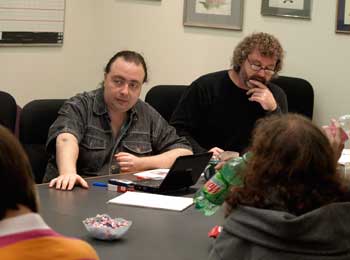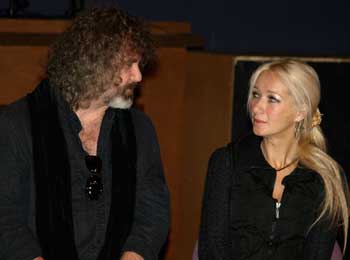A Conversation with
the Translator
Julia M. Smith conducts an email interview with John Freedman about the translation of Olga Mukhina’s Flying. John Freedman, theater critic of The Moscow Times, has published nine books on Russian theater. His play translations have been performed in the United States, Australia and Canada. He is the Russian director of The New Russian Drama Project.
Julia M. Smith is a collaborative theater artist and educator and holds a BFA from NYU’s Experimental Theatre Wing. Until 2008 she was a Senior Artistic Associate for Theatre Action Project and she remains a company member of of various companies based in Austin, TX while completing her MFA at Towson University. Her work has been recognized by the Austin Critic Table Awards, B. Iden Payne Committee, The Austin Chronicle and The New York Times.
JS: What drew you to Mukhina's work in general and this play in particular?
JF: I can’t imagine not being attracted to Olga’s work. It is so unique, so personal, so rich, so evocative. Her work is absolutely unlike any other. There is only one place to go to find dramatic literature like this – to Olga Mukhina. She stands alone. It is a thrilling challenge – to an audience, to a director, to a translator. I was knocked out by Tanya-Tanya when I saw the premiere of the play back in 1996. Within a couple of days I had already chased down Olga’s phone number and I asked her if I could translate the play into English. I had no idea what I was going to do with it at that time. I just knew I wanted to share this amazing play with others. Somehow. Sometime. I think what attracted me instantly – and still has a strong hold today – is the magic of the work. The dream quality that, at the same time, is grounded firmly in reality. Somehow Olga allows us to break free of the bounds of earth while remaining very much inside the world we know and live in. So I translated Tanya-Tanya and then YoU, when she wrote that. By the time Flying came around in 2004, I jumped on it as soon as I could get to it.
JS: Was the translation process of Flying different from the process of translating Tanya-Tanya?
JF: I guess the only thing that changed was that with Flying I already had experience not only in translating Olga’s work, but in communicating with her personally. Her evasiveness; her love of spinning spells with words and dramatic situations; her penchant for caressing you tenderly on the cheek even as she is winding up to punch you in the solar plexus with her other hand; her love of telling you one thing when she actually means another – these are all things that I knew just a little bit better by the time I dug into Flying.
JS: How do you feel Mukhina's work is changing over time?
JF: It’s hard to say. Writing is very, very difficult for Olga. She has only written three plays in the last 14 years! On one hand that makes it difficult to compare the works. She once told me, “I can’t write with my blood!” But the fact is that she, indeed, writes in her own blood. I guess what I mean to say is that her plays are always what she is at the moment that she writes. The total lack of social touch points in Tanya-Tanya led to some very clear social, even political, references in YoU. This was expressed primarily in an unnamed war that rages beyond the limits of the play, but colors almost everything that happens in the play. In Flying the intrusion of the public on the private is actually a major element of the play. This includes the world of television (in Russia, particularly, a tool for state propaganda), and the effect of drugs, easy money and quick success on people’s lives. To some extent Flying is a portrait of people’s lives crumbling under the weight of external, social impulses. So I guess we can see in this a certain development in Olga’s plays from the personal to the public. Nonetheless, Flying, like all Olga’s other works, remains a fiercely private, internal exploration of specific individuals.
JS: In Flying many of the characters work in a television studio or company. How has new media or the access to more media influenced modern Russian culture especially youth culture?
JF: Television in the Putin years was turned back into a propaganda tool. It once again plays a role similar to that which it did in the Soviet era. Young people working for television studios – as Olga once did herself – have access to power, relative wealth, a glamorous lifestyle. These tend to be “beautiful people,” who live in a world apart. They affect fashion trends of all kinds. They form a small, but relatively powerful elite class. Since most tend to be quite young and they often get these jobs without having to actually do anything, it skews the way they see the world. Think, for instance, of the girl in Yaroslava Pulinovich’s play I Won. She becomes a TV host after a simple interview. The boy she falls in love with is on the verge of becoming the chief sound engineer at a TV studio at the age of 21 and without any training at all. Chances are the people in Olga’s Flying got where they are by similar routes. What that means is that they begin to live with an impression that life is easy and success comes automatically. The programs that these people create and broadcast encourage an audience to believe fairy-tales like this. To answer your question directly, the new media in Russia has created a phony, totally unrealistic, but seductively attractive image of being young. There is an incredibly dangerous breach between the image of hip youth and the reality of life as it is lived. Entire lives can disappear into that black gap. Olga’s play is about that. The “glamorous life” is so attractive, but when it comes in and whacks you on the head, you may not get up again.
JS: You and Yury Urnov worked with a group of undergraduate and graduate students at Towson University during the Fall of 2008 to present an abbreviated staged reading of Flying. Have you continued to work on your translation of the play since then and if so ho did that reading influence the continuation of that translation process?
JF: No, the translation that now exists is the one we arrived at by the end of that special course. The cuts that Yury made were done literally in the final days before the staged reading was held. As such, for most of the course we were working on the entire text. During that time I made a lot of changes and did a lot of fine-tuning based on the questions, knowledge and experiences that the students brought to the table. Yury brought up a lot of good points that influenced my attitude to the translation. All of that work is evident – at least to me – in the text as it now stands. I may well return to the translation when a production of the play is mounted, but there would be no reason for me to do that now, without live actors and a director to work with.
JS: Mukhina often displays images alongside the text in her scripts. Did the images she used for Flying impact any of your translation choices?
JF: Those pictures did not influence me in any specific, concrete way. But there is no denying that they are powerful tools that the writer provides for anyone seeking entrance into the world of the work. They create a very tangible system of coordinates, they set out flags reminding you constantly of the kinds of things that express, and have influence on, the people of the play.
JS: In the beginning of the script, Mukhina makes the claim that all of the events are true, even through after reading it we know that to be impossible. As translator of this piece, did you have any conversations with the playwright about this statement?
JF: No, this is a very old and common trick in literature, especially in Russia. It is instantly perceived as a wink from the author, a bit of a fun joke. It sets up a jocular tone before anything actually happens. I could fill an encyclopedia with the names of writers who tease readers with this claim. Alexander Pushkin in the early 1800s insisted that his famous story cycle known as The Tales of Belkin was a collection of prose writings by a man who died recently of a cold, was of average height, had gray eyes, a straight nose and so on. Many a Russian folk tale ends with the words, “I was there, I drank the beer, it wet my beard but missed my mouth.” Now, Olga will be happy to tell you that she didn’t write Flying at all, that she just compiled a bunch of interviews she conducted with her friends. She revels in calling the play a verbatim or documentary play. But don’t ever forget what D.H. Lawrence said: “Never trust the artist. Trust the tale.”

From left, director Yury Urnov and translator John Freedman work with Towson University students to develop the translation of Flying by Olga Mukhina. November 2008. Photo: Robyn Quick

Translator John Freedman and playwright Olga Mukhina at Towson University. December 2009. Photo: Robyn Quick.



